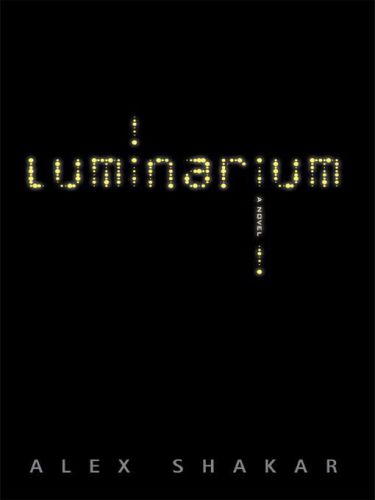
Luminarium
A Novel
کتاب های مرتبط
- اطلاعات
- نقد و بررسی
- دیدگاه کاربران
نقد و بررسی

Starred review from May 16, 2011
Shakar follows up his well-received The Savage Girl with this penetrating look at the uneasy intersection of technology and spirituality. As the five-year anniversary of 9/11 looms, 30-something New Yorker Fred Brounian struggles with the impending death of his hospitalized twin brother, George; the unscrupulous buyout of his Second Lifeâlike company; and the scientific experiments he undergoes that are designed to induce spiritual insight. While Fred's coming-to-terms with George's situation makes for traditional drama, Shakar's blend of the business of cyberspace and the science of enlightenment distinguishes the novel as original and intrepid: Urth Inc., Fred and George's company, is essentially swallowed by megacorporation Armation, which intends to use Urth's technology to build virtual training environments for the military. Meanwhile, Fred is an emotionally vulnerable guinea pig in Mira Egghart's neurological experiments to create a "spiritual odyssey, encoded as easily as a few songs on an iPod." As George nears his end, Fred falls for Mira, learns to meditate, and pursues the perpetrator of a vast cyberscheme threatening to undo both him and Urth. Shakar's prose is sharp and hilarious, engendering the reader's faith in the novel's philosophical ambitions. Part Philip K. Dick, part Jonathan Franzen, this radiant work leads you from the unreal to the real so convincingly that you begin to let go of the distinction.

July 15, 2011
Virtual and "real" reality intertwine in unpredictable ways in this ingenious novel; to his credit, Shakar's approach is more philosophical than sci-fi.
George and Fred Brounian are identical twins, and despite their genetic identity, George is clearly the more brilliant of the two, a visionary who has grown up on video and computer games. One side effect of his background is that he's motivated, by the defects of reality, to transform games into something more vivid than reality itself, so in the late '90s he gets the idea for a simulation called "Urth" and wishes to make it a form of "purer existence," realer than real. Just when he has the financial angels lined up, 9/11 comes about and the financing vanishes, but then the "Military-Entertainment Complex" begins to show untoward interest in the possibilities that George has raised. George, however, wants to use computer gaming as a different form of social engineering, to "steer players toward constructive and nonaggressive behaviors...rather than amassing and plundering and hoarding their resources." Fred is more pragmatic businessman than innovator, and he sees the worth of his brother's creative genius. Also joining them is Sam, their intense younger brother, with an overly deep investment in the avatars of the games George and Fred develop. But George has recently lapsed into a coma, and Fred starts getting some odd e-mails that seem to come from some ethereal world—"Avatara" is their subject line, and they're signed "George." As a form of therapy, Fred begins to visit alternative worlds and has dream visions induced by Mira Egghart, an experimenter with whom he becomes sexually involved.
Shakar succeeds in a delicate balancing act here, securing the novel simultaneously (and paradoxically) in real, virtual and supernatural worlds.
(COPYRIGHT (2011) KIRKUS REVIEWS/NIELSEN BUSINESS MEDIA, INC. ALL RIGHTS RESERVED.)

Starred review from July 1, 2011
Fred's twin, George, is in a coma in a New York hospital five years after the destruction of the Twin Towers. Fred is not only grieving but is also rudderless and broke after losing Urth, their ahead-of-the-curve virtual-world venture, to a rapacious corporation. Fred performs poetic magic acts with his out-of-work actor father; his mother practices Reiki, a spiritual healing technique; and his younger brother, Sam, works feverishly to ready Urth for their overlords at Armation in Orlando, headquarters for the burgeoning Military-Entertainment Complex. Desperate for guidance, Fred signs up for an experimental neurological treatment involving electromagnetic impulses administered by an enigmatic young woman named Mira. While enduring bewildering visions, out-of-body experiences, and other assaults on reality, Fred falls in love, programs an old mainframe to run continual prayers, and tries not to panic as he receives cryptic e-mails from beyond. In his long-awaited second novel after the razor-sharp The Savage Girl (2001), Shakar takes measure of our post-9/11 existential confusion in a technology-avid but science-phobic, ever-complexifying world. A radiantly imaginative social critic, Shakar is also a knowledgeable and intrepid explorer of metaphysical and neurological mysteries. With beguiling characters trapped in ludicrous and revelatory predicaments, this is a cosmic, incisively funny kaleidoscopic tale of loss, chaos, and yearning.(Reprinted with permission of Booklist, copyright 2011, American Library Association.)

























دیدگاه کاربران